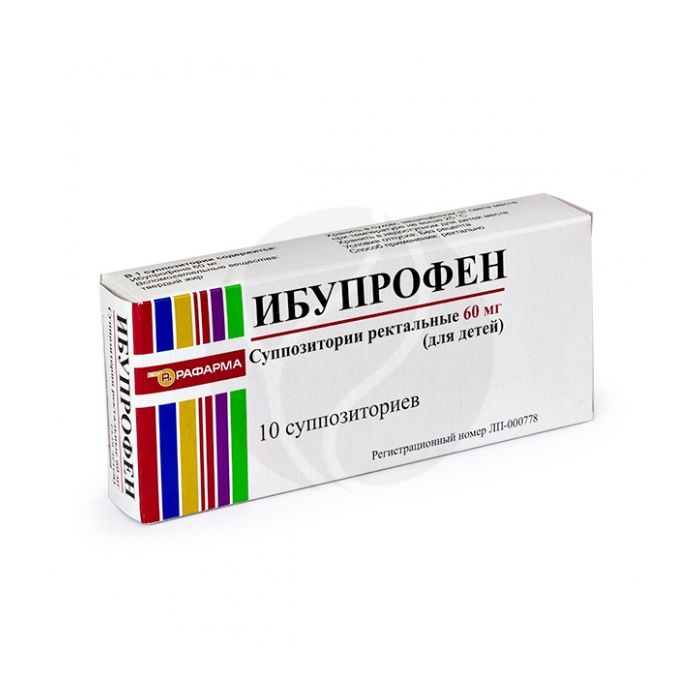Ibuprofen Suppositories for Children 60mg, No. 10
Expiration Date: 11/2025
Russian Pharmacy name:
Ибупрофен суппозитории для детей 60мг, №10
Used in children from 3 months of age to 2 years as:
antipyretic agent for acute respiratory diseases, influenza, childhood infections, post-vaccination reactions and other infectious and inflammatory diseases, accompanied by an increase in body temperature;
anesthetic for pain syndrome of mild or moderate intensity, incl. headache and toothache, neuralgia, pain in the ears and in the throat, pain in case of ligament injuries and other types of pain.
Ibuprofen is a suppository specially designed for children.
The drug is used rectally.
Fever (fever) and pain: The dosage for children depends on the age and body weight of the child. A single dose is 5-10 mg / kg of the child's body weight 3-4 times / day.
The maximum daily dose should not exceed 30 mg per kg of the child's body weight per day.
Children aged 3-9 months (5.5 kg-8.0 kg): 1 suppository (60 mg) 3 times within 24 hours after 6-8 hours, no more than 180 mg / day.
Children aged 9 months-2 years (8.0 kg-12.5 kg): 1 suppository (60 mg) 4 times within 24 hours after 6 hours, no more than 240 mg / day.
Postimmunization fever: 1 suppository for children under 1 year of age, after 1 year, if necessary, another suppository after 6 hours. Duration of treatment: no more than 3 days as an antipyretic agent; no more than 5 days as an anesthetic. If fever persists, seek medical advice. Do not exceed the indicated dose.
Rectal suppositories for children, white or almost white, smooth, torpedo-shaped.
1 supp.
ibuprofen 60 mg
Bronchial asthma, urticaria, rhinitis, provoked by the intake of acetylsalicylic acid (salicylates) or other NSAIDs;
the child has ulcerative lesions of the gastrointestinal tract;
active gastrointestinal bleeding;
inflammatory bowel disease;
confirmed hypokalemia;
blood diseases: hypocoagulation, leukopenia, hemophilia;
renal and / or hepatic impairment;
hearing loss;
hypersensitivity to ibuprofen, acetylsalicylic acid or other NSAIDs, as well as to other components of the drug.
Carefully:
You should consult your doctor before using the drug if the child: is taking other pain relievers; has a history of peptic ulcer disease, gastritis, ulcerative colitis, gastrointestinal bleeding; suffers from liver or kidney disease; takes indirect anticoagulants (drugs for oral administration that reduce blood clotting), drugs to lower blood pressure, glucocorticosteroids, antiplatelet agents, diuretics (drugs to increase urination), lithium drugs, methotrexate; suffers from bronchial asthma, urticaria.
pharmachologic effect
It has analgesic, anti-inflammatory and antipyretic effects. The mechanism of action of ibuprofen is due to inhibition of the biosynthesis of prostaglandins - mediators of pain and inflammation. The action of the drug lasts up to 8 hours.
Side effect
When using the drug, side effects are rare, but the following side effects may appear:
From the gastrointestinal tract: nausea, vomiting, discomfort, or epigastric pain, laxative effect, possibly the occurrence of erosive and ulcerative lesions, bleeding.
Allergic reactions: skin rash, itching, urticaria, exacerbation of bronchial asthma, angioedema, anaphylactoid reactions, anaphylactic shock, bronchospasm, fever, exudative erythema multiforme (including Stevens-Johnson syndrome), toxic epidermal syndrome, Lewis-Johnson syndrome.
From the nervous system: headache, dizziness, agitation, insomnia.
From the side of the cardiovascular system: tachycardia, increased blood pressure.
From the side of hematopoiesis: anemia, thrombocytopenia, agranulocytosis, leukopenia.
From the urinary system: impaired renal function, cystitis.
If these or other side effects occur, you should stop using the drug and consult a doctor.
Application for violations of liver function
With caution in liver diseases. Contraindicated in liver failure.
Application for impaired renal function
With caution in kidney disease.
Contraindicated in renal failure.
Application in children
Used in children from 3 months of age to 2 years
Overdose
Overdose problems occur very rarely, but if you accidentally exceed the recommended dose, then immediately consult a doctor. Symptoms: abdominal pain, nausea, vomiting, headache, rapid eye movements (nystagmus), shortness of breath, cyanosis of the lips and tip of the nose, bradycardia, tachycardia.
Drug interactions
The simultaneous use of Ibuprofen with anticoagulants can lead to an increase in their action. Ibuprofen increases the concentration of digoxin, phenytoin, methotrexate, lithium in the blood plasma when used simultaneously with these drugs. The use of ibuprofen with diuretics and antihypertensive drugs reduces their effectiveness. Strengthens the side effects of mineralocorticosteroids and glucocorticosteroids.

